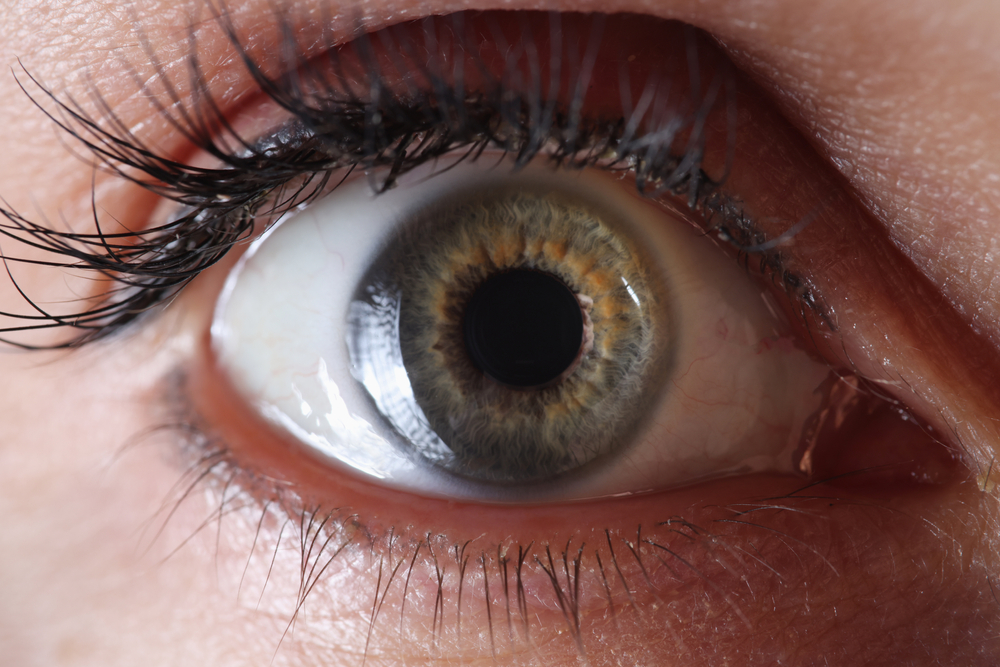While often harmless, the sudden appearance of eye floaters or flashes can cause concern or alarm for some people. These sensations can be unsettling when you don’t understand what’s causing them or whether they may indicate a more serious vision issue.
Keep reading to learn more about flashes and floaters!
What are Floaters and Flashes?

A floater is a small speck or shape that appears to float within your central field of vision. They can look like black or gray spots, squiggly lines, thread-like strands, rings, or cobwebs.
Floaters are caused by clumps of cells floating around in the vitreous humor, which is the transparent, colorless substance that fills the space of your eye between the lens and the retina. In most cases, floaters are harmless and not a cause for alarm.
However, if you experience a sudden onset of many floaters, it could be a sign of a more serious eye condition. Flashes are bright bursts of light that appear suddenly in either your central or peripheral field of vision.
They can appear as arcs, streaks, or in star-like bursts. Like floaters, flashes are caused by disturbances to your retina. Flashes are not usually a threat to the long-term quality of your vision.
However, they can indicate a possible retinal detachment, which can cause permanent vision loss.
What Conditions Can Cause Floaters and Flashes?
Although typically harmless, the appearance of spots, strands, or flashing lights in your vision can occasionally signal an underlying eye condition that requires medical care. This section describes common culprits for eye floaters and flashes ranging from benign causes like aging to more serious conditions such as retinal tears.
Posterior Vitreous Detachment (PVD)
The most common condition that causes floaters and flashes is posterior vitreous detachment or PVD. While seen most often in adults over the age of sixty, in rare instances, it can affect the vision of people forty or younger.
As you age, the vitreous humor starts to shrink and pull on the retina. As the vitreous humor begins to shrink, small solid particles can start to break off and float around the vitreous.
If these particles pass in front of the macula, which is at the center of the retina, they create shadows that you see as a floater. It can also cause you to see flashes at the edges of your vision, particularly in dark environments.
In most cases, PVD does not cause lasting vision impairment. Over time, your eye can adjust to the appearance of floaters and flashes, requiring no further treatment.

Retinal Detachment
Retinal detachment occurs when the retina is pulled away from its natural position at the back of the eye. When the retina becomes detached, it is no longer supported by the retinal blood vessels, which can lead to permanent vision loss.
The sudden appearance of floaters and flashes as well as impaired vision are the first signs of a retinal detachment. Because a detached retina can seriously impair your vision, it is important to seek medical care as soon as possible.
There are several causes of retinal detachment. PVD can cause a gradual detachment of the retina, which makes it important to have your eyes examined regularly for signs of both PVD and retinal detachment.
Other causes of retinal detachment include diabetic retinopathy, age-related macular degeneration, and eye tumors. These eye conditions cause pressure, fluid build-up, and scarring, which can cause the retina to detach.
Migraine Headaches
People who suffer migraine headaches may experience visual disturbances, including flashes of light, as a part of a migraine aura. Migraine auras, which can also include sensory or motor disturbances, are an early warning sign of the onset of a migraine headache attack.
Visual disturbances caused by migraines usually only occur before the migraine itself. While they may be disturbing or distressing, they generally do not cause any lasting damage to a person’s vision.
Other Causes
There are a number of less serious conditions which can cause temporary floaters and flashes. These other conditions include eye inflammation, eye infections, minor eye injuries, and bouts of severe coughing.
What Treatments Are Available for Floaters and Flashes?
In most cases, the appearance of floaters and flashes is considered benign and does not require specific treatment. Often, people who are experiencing floaters and flashes find that, over time, these visual disturbances become less noticeable and less bothersome.

When an underlying condition is the cause of floaters and flashes, it is important to seek proper treatment for that specific condition. For instance, if floaters and flashes are caused by diabetic retinopathy, more careful monitoring and management of blood sugar levels can reduce pressure within the eye and minimize the incidence of floaters and flashes.
If floaters are severe enough to seriously impact a person’s vision, there are more intensive treatment options. These options include vitrectomy, where the vitreous removed and replaced with a synthetic solution, and vitreolysis, which uses a special laser to break up individual floaters.
Unfortunately, new floaters can develop after a more intensive treatment. Because of this, as well as the risks associated with vitrectomy and vitreolysis, they are only recommended for the most severe cases.
While the impact that floaters and flashes can have on your clear vision might be frustrating, they are usually not a sign of a serious eye condition. Most often they are simply another reminder of the inevitability of aging.
The best way to be sure that floaters and flashes are not a threat to your clear vision is by scheduling annual comprehensive eye exams with an experienced and knowledgeable eye care provider like Nevada Eye Physicians!
Are you experiencing flashes or floaters? Schedule an appointment at Nevada Eye Physicians in Las Vegas, NV, today!



